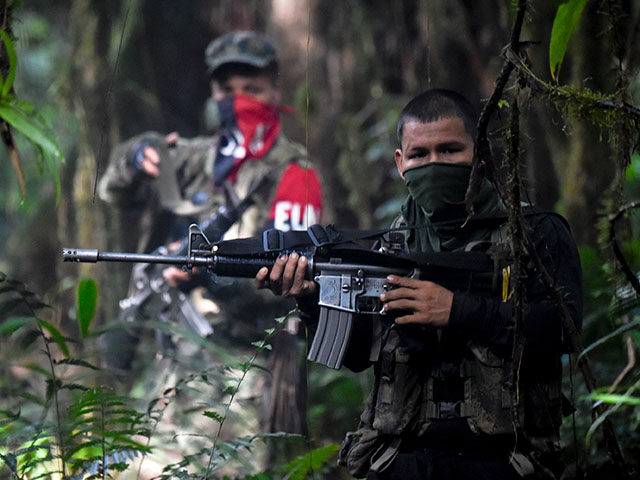Colombia’s radical leftist President Gustavo Petro is reportedly studying the possibility of establishing an international fund to finance the Marxist National Liberation Army (ELN) terrorist organization so that they stop “committing crimes” against Colombian citizens.
The information was confirmed this weekend to Colombia’s Noticias Caracol and other journalists, citing sources from the nation’s Casa de Nariño presidential palace.
According to the sources, the proposal involves the creation of a fund so that several countries can make “financial contributions” to Colombia, which would then be disbursed to the ELN terrorist group. The purpose of the fund, the source told Caracol, would be to entice ELN terrorists to cease actions against civilians such as kidnapping and extortion. The source cited did not specify the names of countries Petro sought to engage in the proposal, nor the amounts the fund would be expected to handle.
Similarly, a “high-ranking member” of Petro’s government accompanying Petro on an official visit to Germany last week explained to Colombia’s RCN Radio on Friday that Petro sought aid from European Union nations to fund the project, also acting as guarantors of the peace process between Colombia and another Marxist narco-terrorist group, the Revolutionary Armed Forces of Colombia (FARC).
Colombia’s Interior Minister Luis Fernando Velasco claimed to RCN Radio that there are “some countries” interested in the proposal — but that it was up to Petro to explain the proposal’s details.
Petro, a former member of the Marxist M19 guerilla, took office in August, becoming the first leftist president in Colombian history.
Petro referred to the possible ELN fund during a joint press conference with German Chancellor Olaf Scholz this weekend, stating that the proposal is “a possibility going forward” and that it depends on eventual agreements signed between the Colombian government and ELN as part of the ongoing peace talks between both sides.
“The peace process with the ELN is progressive, that is why it is called a process and that is where the word peace process comes from,” Petro said on Friday. “It does not happen all at once, in a fulminant, instantaneous way, let peace be declared in Colombia.”
Shortly before Petro’s joint press conference with the chancellor, Colombia’s Office of the High Commissioner for Peace issued a statement in which it claimed that the subject of a fund for the Marxist ELN group “has not been discussed at the peace talks.”
The National Liberation Army is a Marxist terrorist organization founded in 1964 by Colombian rebels trained by the communist Castro regime in Cuba. Much like the FARC, the ELN engages in narcotics trafficking to fund its terrorist activities as well as extortion, kidnapping, and other illicit activities.
The group now also has a significant presence in neighboring Venezuela, where it has received the support of the socialist regime there led by dictator Nicolás Maduro.
As part of Petro’s “Total Peace” initiative, his administration began peace talks with ELN’s leadership in November, with representatives from both sides meeting in Caracas under the auspices of Maduro’s socialist regime.
The latest round of negotiations took place in May in Havana, resulting in both sides signing a 180-day ceasefire deal that will go into effect in August. A new round of negotiations is scheduled to take place between August 14 and September 4 in Caracas.
During the signing of the 180-day ceasefire deal in Havana, ELN’s chief negotiator “Pablo Beltrán,” whose real name is Israel Ramírez Pineda, asserted that while the ceasefire involves the restriction of a “dozen” offensive actions, it does not address suspending kidnappings or extortion activities, reasoning that “if they take one spoon from you, they have to give you another.”
“ELN’s financial operations began to be discussed here, but that discussion is not over,” Beltrán said this month in Havana. “It will continue to be discussed, so these protocols did not enter into these protocols. [sic] We hope that later on they will.”
“For example, if we collect taxes in the regions, those are ELN finances,” Beltrán explained when inquired on what type of financial activities would be discussed. He insisted the group would not kidnap civilians if the kidnappings are not “necessary.”
Colombian Attorney General Francisco Barbosa criticized Petro’s proposal over the weekend, describing it as a “vaccine to Colombians.” Paying a “vaccine” is a widespread slang term used in Colombia and in other Latin American countries to refer to the practice of continued extortion payments that civilians and/or business owners have to give to criminal organizations to receive their “vaccine” and avoid being victims of assault, kidnapping, or worse. Every payment, the idiom goes, is a “booster” shot to keep the “vaccine” against violent crime working.
“Some proposals in recent days, which I hope are not real, [alleged] that they want to establish not a subsidy for the ELN to stop crime — it’s a vaccine against Colombians, so that this vaccine is imposed on Colombians in a massive way, providing an incentive for criminality in different territories of the country,” Barbosa said during an event held by Colombia’s Asobancaria banking association.
Previous administrations have made similar peace talk attempts with ELN — even reaching temporary ceasefire agreements, all of which ultimately fell apart after ELN continued its terrorist activities.
Prior to Petro’s attempts, the preceding government of Iván Duque called off negotiations with the ELN after its terrorists detonated a car bomb at a police academy in January 2019, killing 21.
Christian K. Caruzo is a Venezuelan writer and documents life under socialism. You can follow him on Twitter here.

COMMENTS
Please let us know if you're having issues with commenting.